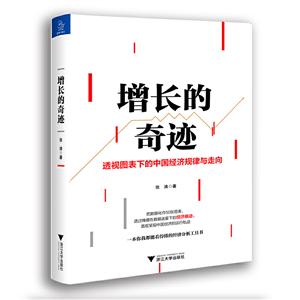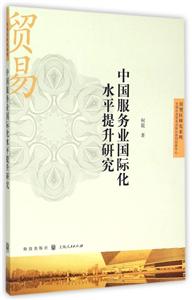读懂中国农业农村农民

|
读懂中国农业农村农民作者:陈锡文 编著;李曼 译 开 本:16开 书号ISBN:9787119114309 定价:80.0 出版时间:2018-04-01 出版社:外文出版社 |
读懂中国农业农村农民 内容简介
中国是一个农业大国,农业、农村和农民问题一直贯穿着中国历史的发展。新中国成立后,农业、农村和农民问题更是中国共产党和中国政府全部工作中的“重中之重”。读懂中国农业、农村和农民,是读懂中国历史和文化的起点,也是理解当代中国经济社会现状的逻辑原点。本书分四章,分别从悠久的中国农业文明、新中国成立至20世纪80年代对中国农业农村发展道路的艰难探索、改革开放至21世纪初中国农村巨变、新世纪以来中国强农惠农富农政策体系的建立等方面梳理了中国农业在各历史时期的发展、面临的困难及政策举措。全书架构清晰、分析客观、数据翔实、史料丰富,在有限的篇幅内用尽量大众化的语言为读者展现出一幅中国农业发展的长卷。从源头为读者释义中国农业发展的脉络及目前发展状况,解答了中国“三农”问题为何关系国家发展、经历了哪些发展过程及今后如何发展。
读懂中国农业农村农民 目录
ForewordChapter 1 China's Time-honored Agricultural Civilization
Section 1 The Origin and Creation of Chinese Agriculture
Section 2 The Oriental Mindset and Four Millennia of Agriculture
Section 3 The Main Agricultural Systems in Ancient China
Chapter 2 Painful Exploration of Agticultural and Rural Development
Section 1 New China: Dirt Poor and All to Be Done
Section 2 Rural Land Reform: Striking Where It Hurt
Section 3 Formation of the State Monopoly on Purchasingand Marketing System
Section 4 The Cooperation Movement and the People's Commune System
Section 5 Why China Chose the Development Path of Rural Collective Land Ownership
Chapter 3 Huge Rural Changes: From Reform and Opening Up to the Turn of the New Millennium
Section 1 Agricultural Production Returned to Farming Households
Section 2 Gradual Revival of the Market Mechanism for Farm Produce
Section 3 Boom in Rural Economy Under Multiple Ownership Systems
Section 4 From Rural Labor to Human Capital
Chapter 4 Establishment of the Policy System to Boost Agriculture, Benefit Farmers,and Increase Their Incomes in the New Millennium
Section 1 Establishment of "Top Priority ldeology
Section 2 New Campaign to Develop Modern Agriculture
Section 3 Great Efforts to Increase Farmers' Incomes
Section 4 Building a New Socialist Countryside
Section 5 Resolutely Fighting for Victory in the Battle Against Poverty
读懂中国农业农村农民 节选
《读懂中国农业农村农民(英)》: 1. China's agricultural civilization and the map of world civilizations Mankind has millions of years of history that can be studied. Two and a half million years ago, when human beings were just coming down from the trees and walking on the ground, they subsisted mainly as hunter gatherers. It was not until ten thousand years ago that agriculture emerged to become an important revolutionary power that pushed forward human society. Without any doubt, agriculture is mankind's most important invention to date. In the logic of history's course, general trends are more important than details, and tendencies more weighty than specific events. As tegards crucial factors influencing the origin of agriculture, besides the evolution of human cognitive abil/ty, one can point to changes in the general climatic environment, the specificity of particular species such as wheat, rice, and tamable animals growing in particular places, and even the possible beliefs of om: ancestors as playing important roles in the emergence of agriculture, environmental changes probably being the most direct factor. It is generally accepted that, because the most recent glacier recession occurred between 10,000 and 12,000 years ago, man's primitive agriculture emerged during the Neolithic Age of that period (about 5,000 to 10,000 yeafS ago). The most important symbol of the Neolithic Age is the cultivation of crops, and the development of agricultural production facilitated division of labor in human society, which in turn enabled the rise of aty civilization some 5,000 years after that. In human history, the spafks of ancient civilization appeared in quite a few places, yet they died out Of were extinguished one by one over the passage of time. Countries in the valleys of the Nile and of the Tigris-Euphrates that first entered the civilization era around 4000 BC followed each othef into decline in 6th and 4th century BC respectively under the impact of foreign invasions. The Dravidian people established the splendid Harappa culture in the Indus Valley around 2500 BC, but had vanished by 1750 BC. After the Aryan invasions of 1000 BC, the In dia region entered a long period of division. Civilizations in the Americas had glorious achievements but later becarrie mired in stagnation. China is one of the handful of places where the world's agricultural civilization originated and developed without interruption, which must be counted a miracle in the development of human society. According to the latest archaeological findings, China's history of agriculture can be dated as far back as 10,000 BC, basically around the same historical period as the emergence of agriculture in West Asia. By around 7000-8000 BC it had developed qLute prosperously Some archaeological findings have even challenged the perceived wisdom regarding China's agricultural history. For example, it was assumed that wheat was not produced in China originally but introduced to China from the Western Reg:ions. However, that assumption was overturned with the wheat unearthed at Diaoyutai Village, Haoxian County, Anhui Province, which can be dated back to the Western Zhou Dynasty (1046-771 BC). The later discovery of 5,OOO-year-old wheat and barley grains at Donghuishan, Minle County, Gansu Province, gave an even earlier date for China's wheat growing history. ……
经济 经济理论
在线阅读
- 最新内容
- 相关内容
- 网友推荐
- 图文推荐
| [高考] 2022 西安电子科技大学《软件工程》大作业答案 (2022-04-25) |
| [家长教育] 孩子为什么会和父母感情疏离? (2019-07-14) |
| [教师分享] 给远方姐姐的一封信 (2018-11-07) |
| [教师分享] 伸缩门 (2018-11-07) |
| [教师分享] 回家乡 (2018-11-07) |
| [教师分享] 是风味也是人间 (2018-11-07) |
| [教师分享] 一句格言的启示 (2018-11-07) |
| [教师分享] 无规矩不成方圆 (2018-11-07) |
| [教师分享] 第十届全国教育名家论坛有感(二) (2018-11-07) |
| [教师分享] 贪玩的小狗 (2018-11-07) |






